

Who Are the Doctorate Holders and where Do Their Qualifications Lead Them? La Universidad no es gratis. Equity, Excellence and Inclusiveness in Education. Situación de la educación superior en Colombia - Especiales. ‘Universidades’ cerradas por orden del Ministerio de Educación que reabren al poco tiempo en las mismas instalaciones y hasta con los mismos pupitres, simplemente con otro nombre.
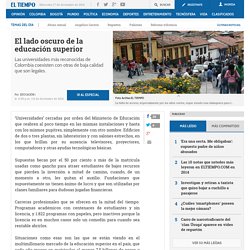
Edificios de dos o tres plantas, sin laboratorios y con salones estrechos, en los que brillan por su ausencia televisores, proyectores, computadores y otras ayudas tecnológicas básicas. Supuestas becas por el 50 por ciento o más de la matrícula usadas como gancho para atraer estudiantes de bajos recursos que pierden la inversión a mitad de camino, cuando, de un momento a otro, les quitan el auxilio. Shedding light on teaching and learning across education levels. By Katarzyna KubackaAnalyst, Directorate for Education and Skills Looking at teachers at all levels of education, we learn that the majority of teachers are women.
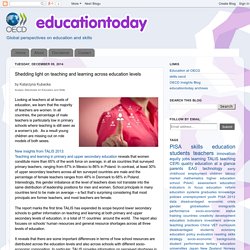
In all countries, the percentage of male teachers is particularly low in primary schools where teaching is still seen as a women’s job. As a result young children are missing out on role models of both sexes. Universidades: una crisis a punto de explotar. Mientras los colombianos no paran de sorprenderse con los escándalos producidos por los malos manejos de algunas instituciones educativas privadas del país, como la Universidad San Martín o la Rafael Núñez de Cartagena, en los últimos meses se ha acrecentado una crisis en la mayoría de las universidades públicas regionales que amenaza con estallar en cualquier momento.
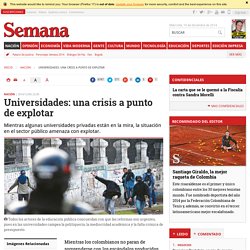
Gran parte de las 32 universidades públicas regionales tienen serios problemas que van más allá de los financieros. Allí no solo se palpa la falta de calidad y los enredos presupuestales, sino que surgen también enormes líos de gobernabilidad. Huelgas, salones abarrotados y edificios decaídos; rectores ultrapoderosos, nepotismo, pujas internas de poder y denuncias de corrupción y politiquería son cada vez más frecuentes. Ese desgobierno es un cáncer que nadie trató durante años y que ha hecho una metástasis tan peligrosa, que requiere medidas urgentes.
El drama no termina ahí. Why education policies matter for equality - Forum:Blog Forum:Blog. Much of the debate on inequality focuses on its deleterious social and political effects and its impact on growth.

But an equally important question is which policies play a clear role in reducing income inequality. The results of our new study suggest that improvements in education – even more than factors such as government expenditure or financial-sector development – have contributed in an important way to reducing income inequality within countries. Growth-equality nexus In our study, we first explore whether a country’s income distribution becomes more equal as it grows richer – a question that has intrigued economists as far back as Simon Kuznets. Trust: What it is and Why it Matters for Governance and Education. What's the best teaching method? Seventy teachers from the UK were sent to Shanghai to study classroom methods to investigate why Chinese students perform so well.
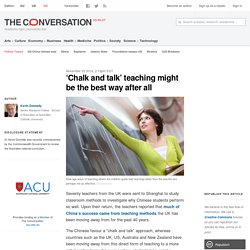
Upon their return, the teachers reported that much of China’s success came from teaching methods the UK has been moving away from for the past 40 years. The Chinese favour a “chalk and talk” approach, whereas countries such as the UK, US, Australia and New Zealand have been moving away from this direct form of teaching to a more collaborative form of learning where students take greater control. Given China’s success in international tests such as PISA, TIMSS and PIRLS, it seems we have been misguided in abandoning the traditional, teacher-directed method of learning where the teacher spends more time standing at the front of the class, directing learning and controlling classroom activities. A chance to design the way forward for education. By Michael WardSenior Policy Analyst, the Development Co-operation Directorate Want to get involved in shaping the future of education?
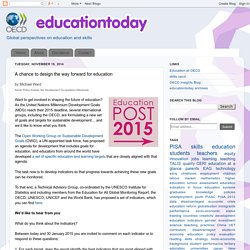
As the United Nations Millennium Development Goals (MDG) reach their 2015 deadline, several international groups, including the OECD, are formulating a new set of goals and targets for sustainable development… and we’d like to know what you think. The Open Working Group on Sustainable Development Goals (OWG), a UN-appointed task force, has proposed an agenda for development that includes goals for education, and educators from around the world have developed a set of specific education and learning targets that are closely aligned with that agenda.
The task now is to develop indicators so that progress towards achieving these new goals can be monitored. What PISA can – and can’t – tell us about adults’ skills. By Marilyn AchironEditor, Directorate for Education and Skills Can PISA results predict the quality of a country’s labour force one decade later?
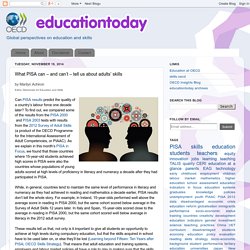
To find out, we compared some of the results from the PISA 2000 and PISA 2003 tests with results from the 2012 Survey of Adult Skills (a product of the OECD Programme for the International Assessment of Adult Competencies, or PIAAC). As we explain in this month’s PISA in Focus, we found that those countries where 15-year-old students achieved high scores in PISA were also the countries whose populations of young adults scored at high levels of proficiency in literacy and numeracy a decade after they had participated in PISA. While, in general, countries tend to maintain the same level of performance in literacy and numeracy as they had achieved in reading and mathematics a decade earlier, PISA results don’t tell the whole story.
Los barrios de París (infografía) Siempre se vuelve a París.

Education lessons from South Korea. As countries strive to grow, build well-being and fight inequality, it is clear that education must adapt to changing global needs.
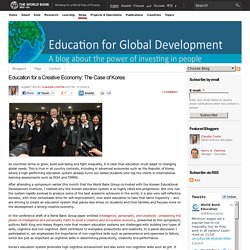
This is true in all country contexts, including in advanced economies such as the Republic of Korea, where a high-performing education system already turns out skilled students who top the charts in international learning assessments such as PISA and TIMMS. After attending a symposium earlier this month that the World Bank Group co-hosted with the Korean Educational Development Institute, I realized why the Korean education system is so highly rated and progressive.
Not only has the system rapidly evolved to produce some of the best academic achievers in the world; it is also very self-reflective. ¿Ha fallado el sistema económico estadounidense? Dos nuevos estudios muestran, una vez más, la magnitud del problema de la desigualdad que azota a Estados Unidos.
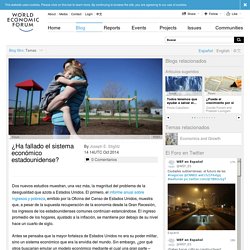
Education lessons from South Korea. Lo educado no quita ‘lo chunchurria’ Nunca me canso de citar en mis clases esas palabras tan bellas del polaco Ryszard Kapuscinski: “No hay periodismo posible al margen de los seres humanos (…) para ejercer el periodismo, ante todo, hay que ser buen hombre o buena mujer. Si se es una buena persona se puede intentar comprender a los demás, sus intenciones, su fe, sus intereses, sus dificultades y sus tragedias”. “Hay que invertir en la educación temprana” Excellence through Equity.
OmniSchool Presentation Vesterinen 041114 - Prezentacje Google. OmniSchool Research & Service Design by Olli Vesterinen on Prezi. OmniSchool Presentation Vesterinen 041114 - Google Slides.